Team Experience is discussing the various Oscar categories. Here's Eric Blume and Nick Taylor discussing Best Director.
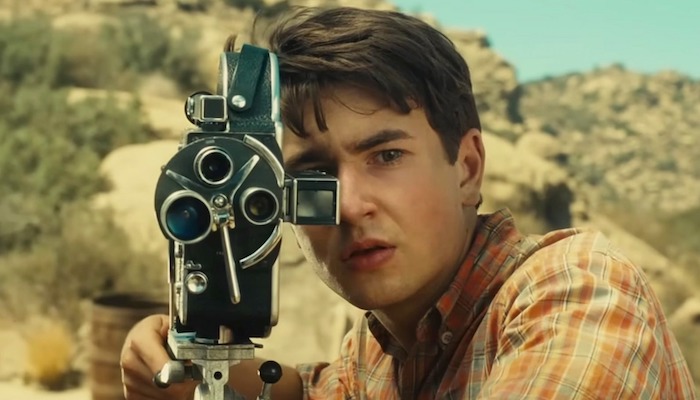 Portrait of a young director via THE FABELMANS
Portrait of a young director via THE FABELMANS
ERIC BLUME: Hi Nick! I'm excited to talk Best Director with you. This year's line-up, while I'd swap out a name or two in there personally, is extraordinarily strong, perhaps one of our best ever? Before we get to each one, who were personal favorites of yours that didn't make the ballot?
NICK TAYLOR: It’s a very strong lineup! Only one of the names Oscar picked would be close to my own ballot, but I see plenty of strengths in the work the Academy nominated, and the competitiveness of this field leading up to nomination morning means nobody coasted to their slots...
As of this moment the two unnominated names I’m most excited about are Charlotte Wells for Aftersun and Jerzy Skolimowski for EO. Both of them take wild, entrancing risks with photography, editing, sound, and story structure on behalf of suggestive, vivid protagonists who invite lots of audience projection but remain firmly unknowable. Audrey Diwan’s handling of character-and history-specific tensions and complexities is just marvelous in Happening, as is Sergei Loznitsa’s control over Donbass’ mordant carnival of geopolitical farce and governmental abuse. I still need to decide on my fifth slot, but Alice Diop for Saint Omer, Kiro Russo for The Great Movement, Phil Tippet for Mad God, and Ninja Thyburg for Pleasure deserve all the love in the world.
How about you Eric? Which faves of yours would you want to shout out?
ERIC: Nick, your sentence about Wells and Skolimowski is so rapturously perfect! I struggled a bit with Wells' work on Aftersun. I felt it was a bit too muted, and she was overly fond of shots that were two-thirds sky! But your phrasing alone makes me like it better! And I certainly loved the sensual fleshiness she focused on...so many lovely moments in that film though I didn't love it as a whole. I do agree wholeheartedly with Skolimowski gifting us with one of the year's greatest achievements, resisting any attempt to anthropomorphize or falsely dramatize, and plunging us into mystery, fear, and wonder.
My top almost-there this year is Alejandro Inarritu, who with Bardo made a far, far more personal movie than Spielberg, in the way only he could, in an intoxicating blend of images that is neither dreamlike nor stylized...just the world presented as he alone sees it, as a man torn between countries and identities. I usually love Inarritu's forcefulness, but Bardo was achingly vulnerable and I found myself with tears running down my face in the film's final moments. And I was wowed by Park Chan-wook's gorgeous Decision to Leave. He took a genre I actually loathe (cop who falls in love with a mysterious woman) and found fresh beats, a throbbing heart, and some new storytelling language for disorientation and texture. I do giggle, though, as our optional picks are not exactly the most commercial. Nobody will be hiring us at Paramount.
Let's wait a beat to get to the actual race. First I'd love to hear your thoughts on all of the five nominees and their work...
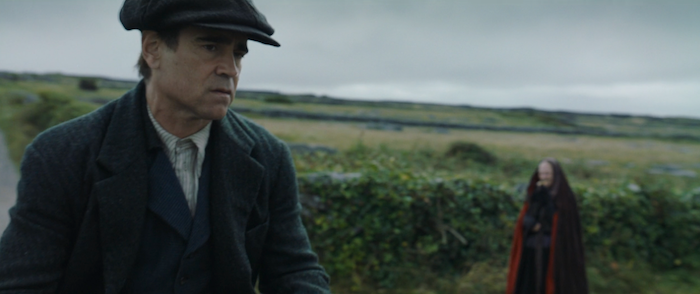 THE BANSHEES OF INISHERIN
THE BANSHEES OF INISHERIN
NICK: Well they should be hiring us! I love your two picks, and completely agree with you on their merits. Bardo nails a pretty profound balance of vulnerability, artifice, and Fellini-esque surrealisms that get at something biting and personal without Iñaritu feeling the need to falsely humble himself for the sake of sincerity. Decision to Leave is somehow even more excessive, yet it too finds room for strange, gorgeous intimacies within the tropes it fronts and inverts. They’re wonderful achievements, and I’m glad you singled them out.
I’ll be diplomatic with the director nominees and go alphabetically by their films. This also means we’re starting with Martin McDonagh for The Banshees of Inisherin, the person whose direction I’m least impressed by. Distinguishing traits of McDonagh the writer are not at all present in McDonagh the Director, whose conception of editing and image-making are flatly pedestrian. It’s not incompetent, but the postcard quality of the color grading, the minimal reaction shots, and the total lack of interest in letting an image or a cut reveal something about his characters or their situation just looks unimaginative. I still don’t understand how he’s so bad at dramatizing spatial geography - how fucking big/small is this place, and why does the thematic “point” of this isolated-yet-suffocating small town never have a real visual idea to convey it?
On a positive note, I’m impressed by the crafty, sensitive turns he gets from his performers, despite the purposefully brash attitude conveyed by his writing and the often broad strokes of his direction. But skill with actors is a talent all of his fellow nominees possess, and they’re all far nimbler with complex tones and difficult characters while enhancing those traits with real cinematic technique. Apologies if I’ve been shit-talking your favorite of the year.
ERIC: I love a man with an opinion! I love Banshees, but I can agree that the direction is the weakest of its chief creative elements. While I agree that all the directors are good with actors, I'd say some of them (Spielberg and The Daniels) are shakier than others, or at least more inconsistent. Yes, McDonagh has hired great actors, but the performances he gets from them are beyond expert...he keeps them in constant flow of comedy and tragedy, and the spirit in their acting is the spirit of the film, and tonally he keeps things fully on track. So I'd argue his flair with actors is beyond the typical director, even some nominated here. But yes, he still thinks as a writer first and director second, and you're spot on that his image-making leaves a bit to be desired. He's still in "proficient" mode most of the time. But I do think he's growing. I thought Banshees marked a major step forward for him, particularly in terms of framing...the way he places Ferrell and Gleeson in frame together (including the final time we see them...on either end of the screen with "death" in between them) shows that he's starting to think in more visual ways. And he takes risks this time. The old lady death character shouldn't work at all, it's a boldly symbolic element, but he folds it into his narrative in a lovely way. He'd probably be my fifth choice, and I wouldn't have nominated him, but it's leaps and bounds stronger than his past work, IMO.
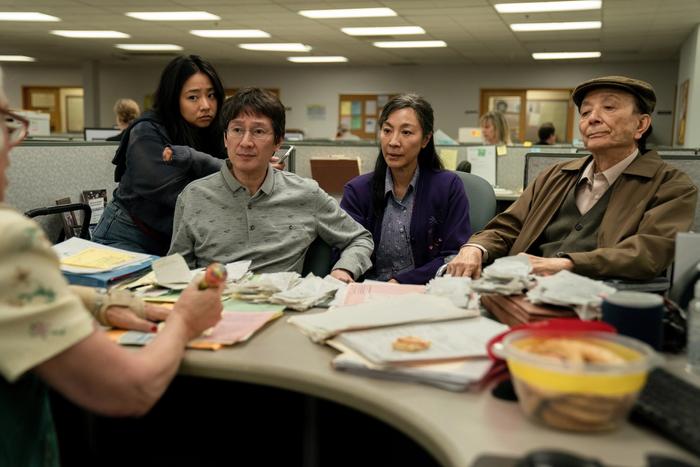 EVERYTHING EVERYWHERE ALL AT ONCE
EVERYTHING EVERYWHERE ALL AT ONCE
So next up would be The Daniels for Everything Everywhere All At Once. I think they've made a feisty, original, wonderful film that's been a tad overpraised, but for fucks sake, they are talented. The thing that makes the movie, and their work on it as both writers and directors, so fun is that they have this sweeping everything-but-the-kitchen-sink ethic to them: they made this movie as if it might be the last movie they'd ever get to make. That's a winning energy for a film, and I deeply admire them for it. But that's also the limitation to me...the movie has everything but the kitchen sink. It's too full of ideas, and some of those ideas are gorgeously presented in wildly fresh ways, and others are managed a little messily. Again, I get it, that's the fun of the picture, but I think when they distill some of their ideas, they're going to make a masterpiece. Freakishly gifted guys. What is your take on The Daniels?
NICK: If ever a film lived up to its title! I agree about the excess and the mess, but especially on rewatch, I really admired how much The Daniels were willing to do, and how that muchness translates into a coherent experience. Conviction fuckin matters for a film like this, and it‘s so evident how much this means for The Daniels. The scope of assembling this thing is nuts, from the varied shooting styles to the insane editing and sound regimens (plus all the accenting of personality in costumes, sets, and makeup), and their formal interweaving of so many universes and genres is pretty impeccable. I wouldn’t mind some satellite figures and gags trimmed from the script, but their execution achieved enough comedic or emotional resonance towards the film’s larger ideas that I didn’t mind. More importantly, there’s a real core of mundane, unfulfilled sadness at the heart of these characters and the performances of the actors, and the genre-blending, reality-shifting premise fully serves their semi-connected, semi-fractured relationships rather than distracting from it.
I think the Daniels really build off of the ambitious script they’ve written for themselves, making something formally impressive and emotionally legible even amidst so much stuff. Given that EEAAO seems poised to do very well on Oscar night, I’d be very, very happy if they won, both on their own merits and because it’d be a vote for a whole series of genres and filmmaking approaches Oscar rarely cottons to so enthusiastically.
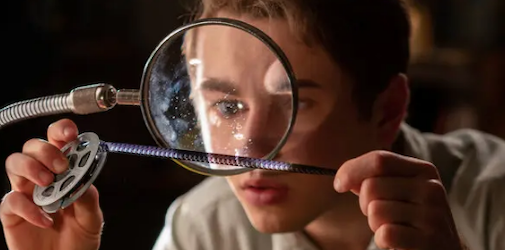 THE FABELMANS
THE FABELMANS
After them comes Steven Spielberg for The Fabelmans, in the running to win his third Oscar for Best Director. I am less enthusiastic overall about The Fabelmans and Spielberg’s stewardship of it, though there’s plenty to admire about it. There’s enough complexity in its depiction of every relationship in that family to fill several films over, though that did not translate to me thinking every actor and character were equally assisted by Spielberg’s guidance. There’s so much intricacy to it, but also several scenes that only announce its subtler ideas at a louder frequency. Do we even need Judd Hirsch’s character when the one, haunting shot of Sammy mentally staging his parent’s divorce illuminates the same ideas of an artistic being inherently in conflict with their loved ones, let alone themselves? It’s a challenging object for me to wrap my thoughts around, but I’m so glad we have it.
ERIC: Great case for The Daniels, Nick! And it sounds like we're about even on our feelings on The Fabelmans. Indeed, much to admire, and it's one of Spielberg's best latter-career films for sure. He gets a terrific performance out of young Gabriel Labelle, and here he delivers quality commercial product that's filled with heart and wonder. But for a filmmaker making his "most deeply personal film" Spielberg doesn't open himself up very much. The biggest dramatic turning points are standard-issue-movie stuff, ma-cheats-on-pa material that only reveal that his family is just...normal? It's not incredibly personal to show people that you're family just isn't perfect. But Spielberg scores in the sections with young Labelle making his first movies, and there's lovely moments throughout. All of Spielberg's scenes at the high school, however, are sitcommy and are tonally out of sync with the family stretches. It's an engrossing and satisfying movie, but nothing someone should be winning an Oscar for helming.
Which brings us to Todd Field for Tar. I don't know where to begin about this remarkable achievement, so how about you go first...
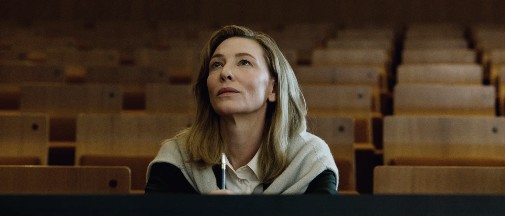 TÁR
TÁR
NICK: Oh I’m so happy about this nomination. I think what Todd Field does is the cream of this crop (I would probably reward TÁR in most of the categories it’s up for). I love how much he does to complicate his script, itself a nasty piece of work that would still leave room for a duller director to flatten and moralize. Look at how the film shifts in and out of Tár’s point of view in the blocking and editing of scenes like her “spontaneous” decision to host tryouts for the solo concert piece she’s stealing out from under the presumed candidate so she can entice her new plaything, communicating that the orchestra collectively sees what their conductor is doing despite her presumed discretion. See how Nina Hoss’s Sharon emerges with her own unvoiced compromises and observations of her wife rather than a blank stare in scene after scene, to say nothing of the ferrety, unraveling star turn Field has conjured from his leading lady.
There’s so much to unpack after one viewing, let alone a second or third, about Tár’s abuse of power and complicity in her student’s demise, about whether or not she’s talented or guilty (or in a fucking dream, apparently. bleh!). All of it is buoyed by Field’s stretching of time and unusual formal angles, which suggests a bitch who binged Haneke in lockdown but also makes his angular compositions and haunted sound design utterly rooted in this woman’s psyche. I’m afraid if I keep talking I’ll reach for more hyperbole, so let me throw the baton back to you Eric.
ERIC: Nick, your words on Todd Field's work here are so blisteringly perfect that I won't say much other than you can't really speak hyperbolically about it...it truly IS that amazing. It's the directorial feat of the year, so technically and formally accomplished, so ferociously controlled and modulated, yet at the same time feeling completely in the moment and immediate. He and Blanchett pulled off some kind of miracle together that we're unlikely to see again any time soon.
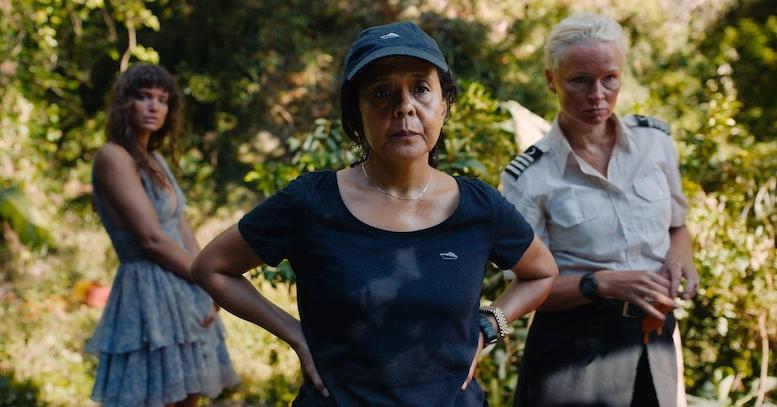 TRIANGLE OF SADNESS
TRIANGLE OF SADNESS
So before we get to the who-wins question, let's talk about our final nominee, Ruben Ostlund for Triangle of Sadness. I think Ostlund's work is also some kind of crazy genius, even though his audacity doesn't always land, he's going in BOLD. With cinema, we tend to value subtlety above all else. But purposeful un-subtlety can have its own glorious artistic worth. And that's Ostlund. I've been saying since seeing the picture that Ostlund is our modern-day Luis Bunuel (and I was annoyed to see the Criterion dvd cover note it as well). Bunuel took on the same themes that Ostlund does, with the same over-the-top style, and history has been kind to him because his attack into his subjects and characters is so lacerating and uncompromised. Triangle of Sadness is SO absurd: it literally has PIRATES who BLOW UP the ship and everyone in it, mercilessly. He then has one piece of the ship survive, and it becomes a fucktank. He casts two of the most perfectly beautiful human specimens and reduces them to children fighting over a check; introduces morally bankrupt rich folks who have achieved wealth from THE MOST NEFARIOUS means possible, and crescendos with a gross and comic set piece where their bile spouts of their mouths and asses. Then he gives the poorest person on the ship a power reversal. I mean, the BALLS on Ostlund! Everything in this movie is in extremes, he has no intention to be graceful. I think sometimes we need to celebrate when someone goes so artfully big to illustrate both the comedy and terror of the world we live in.
Nick, I'm nervous to ask: what are your thoughts on Ostlund and his nomination here?
NICK: I am definitely less enthusiastic about Triangle of Sadness than you are, but this is gutsy work for all the reasons you said. I've seen folks describe the scenarios you've listed as too simplistic or extreme as written to really land, especially when Ostlund's approach to those scenes is to bloat them past the breaking point and let the character's noxious, vapid behavior stink up the joint, even before we get any bile. It's a profoundly pitiless film, and although I went back and forth on how tasteful or easy or cruel I thought Triangle of Sadness was at any given moment, it's really stuck with me. The blunt, uncomfortably protracted dynamics of scenes like two influencers needling each other over a bill at an expensive restaurant or Abigail's announcement of her own supremacy among the survivors work on their own terms while serving the larger themes of the film. Ostlund also wins points for getting his whole cast, from star players to extras to unexpectedly long-lasting figures, to play off each other and use those elongated scenes to illuminate all the petty, reflexively self-serving impulses of their characters.
As far as predicting winners goes, Ostlund seems least likely to win the prize. McDonagh’s best shot is in Original Screenplay, and Field seems like a potential spoiler in both categories without convincing me he’ll pull off either. After winning DGA, plus Everything Everywhere All At Once coming out way on top with PGA and SAG, the Daniels look poised to repeat their success with the Oscars. EEAAO’s bad showing at BAFTA makes me wonder if it could miss out due to lack of interest overseas, but that’s been equally true for Spielberg and The Fabelmans. Part of me wonder if we’re gonna get lone Best Director wins two years in a row, with Spielberg being the only win for his film. Still, I’ll bet the Daniels come out on top here even if they lose Screenplay (which I don’t think will happen). My vote would go to Field, but aside from McDonagh I’d be happy with any of these guys winning.
ERIC: Sounds like we're on the same page with the race itself, which looks like this:
Will Win: The Daniels
Should Win: Todd Field
Spoiler: Steven Spielberg
And I think we both feel good about a win for The Daniels for their original, captivating work.
RELATED: